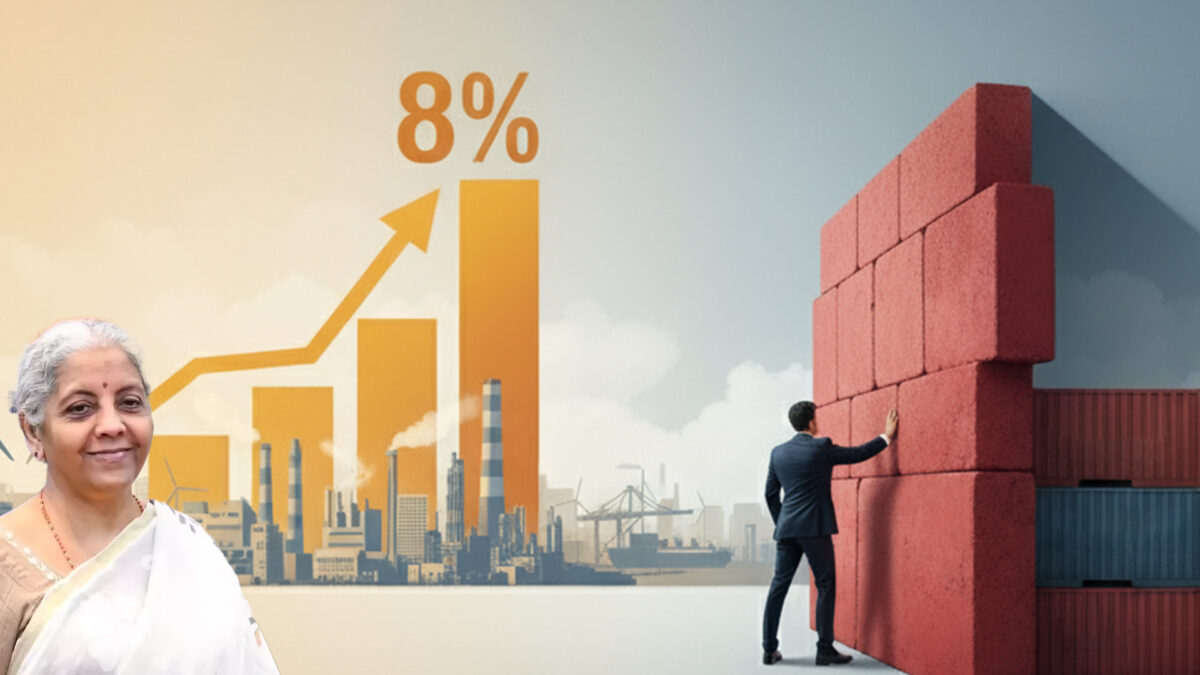Union Finance Minister Nirmala Sitharaman on Friday highlighted India’s determination to achieve 8% GDP growth despite mounting global economic challenges, emphasizing that tariffs and geopolitical tensions are reshaping the international economic landscape.
Speaking at the Kautilya Economic Conclave 2025, Sitharaman noted that while global trade disruptions are significant, India’s growth remains anchored in strong domestic fundamentals.
The Finance Minister pointed out that rising tariffs, sanctions, and decoupling strategies are altering global supply chains, creating uncertainties for international trade. She acknowledged the impact of recent measures, including the U.S. doubling tariffs on Indian imports to 50%, which has affected export competitiveness.
Yet, she stressed that India is well-positioned to absorb external shocks due to its resilient economic structure and diversified domestic demand.
Sitharaman reiterated that achieving 8% growth is crucial for India’s vision of becoming a developed nation by 2047. She clarified that this target does not imply economic isolation but rather emphasizes self-reliance while maintaining active participation in the global economy. According to the Finance Minister, India’s growth strategy balances strengthening internal markets with engaging international trade and investment opportunities, ensuring long-term sustainability.
To mitigate the impact of global economic disruptions, the government has committed to a record infrastructure spending program for the fiscal year ending March 2026. This initiative, amounting to over ₹11 trillion, is intended to stimulate domestic demand, support job creation, and enhance connectivity across regions. The Reserve Bank of India has also maintained its policy rate at 5.5%, signaling potential monetary easing in the near future to sustain investment and consumption.
Sitharaman underscored the importance of reforms and strategic planning to navigate external pressures. She highlighted India’s capacity to adapt to shifting global dynamics, including realignment of supply chains and diversification of trade partners. While acknowledging that global uncertainties may affect growth projections in the short term, she remained confident that India’s focus on infrastructure development, investment in human capital, and policy stability will help sustain long-term economic expansion.
The Finance Minister’s remarks come amid broader global economic volatility, where tariffs and trade restrictions are increasingly influencing the flow of goods and capital. Analysts note that while external pressures may temper growth, India’s domestic consumption, technological adoption, and policy support remain strong drivers of economic momentum.
Sitharaman concluded by reaffirming the government’s commitment to creating a conducive environment for investment, innovation, and enterprise, stressing that India is prepared to meet its growth ambitions despite the evolving global trade landscape.
She emphasized that maintaining policy stability, boosting infrastructure, and supporting key sectors are central to ensuring that India not only weathers external shocks but continues on its path toward sustainable, high-quality growth.
With India targeting an ambitious 8% GDP growth, the government’s proactive measures and focus on domestic resilience aim to shield the economy from global turbulence while positioning it for long-term development.
Also Read: Blackstone Nears $12.9 Billion Target for Asia Buyout Fund
